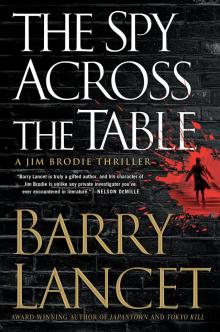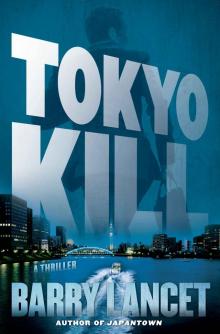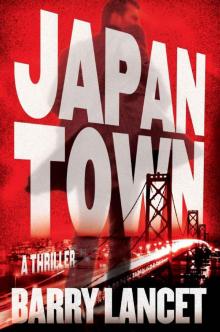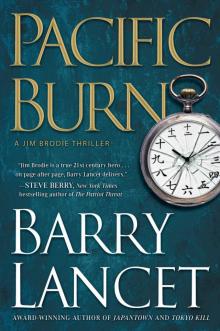- Home
- Barry Lancet
Japantown
Japantown Read online
Thank you for downloading this Simon & Schuster eBook.
* * *
Join our mailing list and get updates on new releases, deals, bonus content and other great books from Simon & Schuster.
CLICK HERE TO SIGN UP
or visit us online to sign up at
eBookNews.SimonandSchuster.com
Simon & Schuster
1230 Avenue of the Americas
New York, NY 10020
www.SimonandSchuster.com
This book is a work of fiction. Any references to historical events, real people, or real places are used fictitiously. Other names, characters, places, and events are products of the author’s imagination, and any resemblance to actual events or places or persons, living or dead, is entirely coincidental.
Copyright © 2013 by Barry Lancet
All rights reserved, including the right to reproduce this book or portions thereof in any form whatsoever. For information address Simon & Schuster Subsidiary Rights Department, 1230 Avenue of the Americas, New York, NY 10020.
First Simon & Schuster hardcover edition September 2013
SIMON & SCHUSTER and colophon are registered trademarks of Simon & Schuster, Inc.
The Simon & Schuster Speakers Bureau can bring authors to your live event. For more information or to book an event, contact the Simon & Schuster Speakers Bureau at 1-866-248-3049 or visit our website at www.simonspeakers.com.
Designed by Kyoko Watanabe
Jacket design by Thomas Ng
Jacket photographs: man © Michael Trevillion/Trevillion Image; bridge © SuperStock/Corbis
Library of Congress Cataloging-in-Publication Data
Lancet, Barry.
Japantown / Barry Lancet—First Simon & Schuster hardcover edition.
p. cm.
1. Antique dealers—California—San Francisco—Fiction. 2. Japanese—California—San Francisco—Fiction.
3. Murder investigation—San Francisco (Calif.)—Fiction. 4. Murder investigation—Japan—Fiction. 5. Japantown
(San Francisco, Calif.)—Fiction. 6. Mystery fiction. I. Title.
PS3612.A547486J37 2013
813'.6—dc23 2012049519
ISBN 978-1-4516-9169-6
ISBN 978-1-4516-9171-9 (ebook)
The translation of Rengetsu’s “The Thief,” as found in Lotus Moon: The Poetry of the Buddhist Nun Rengetsu (Weatherhill, 1994), is reprinted with the permission of John Stevens.
To my parents, Bob and Lenny, for their unflagging support,
and to those of my Japanese friends who have always felt “hemmed in”
A wise man hears what makes no sound and sees what has no shape.
—ZEN PROVERB
Contents
Epigraph
Day 1: Not a Trace of the Thief
Chapter 1
Chapter 2
Chapter 3
Chapter 4
Chapter 5
Chapter 6
Chapter 7
Chapter 8
Chapter 9
Chapter 10
Chapter 11
Chapter 12
Chapter 13
Chapter 14
Day 2: The Tell
Chapter 15
Chapter 16
Chapter 17
Chapter 18
Chapter 19
Chapter 20
Chapter 21
Chapter 22
Day 3: Kingbreaker
Chapter 23
Chapter 24
Chapter 25
Chapter 26
Chapter 27
Chapter 28
Chapter 29
Day 4: The Village
Chapter 30
Chapter 31
Chapter 32
Chapter 33
Chapter 34
Chapter 35
Chapter 36
Chapter 37
Chapter 38
Chapter 39
Day 5: Shadow Shogun
Chapter 40
Chapter 41
Chapter 42
Chapter 43
Chapter 44
Chapter 45
Chapter 46
Chapter 47
Chapter 48
Day 6: Black Marilyn
Chapter 49
Chapter 50
Chapter 51
Chapter 52
Chapter 53
Chapter 54
Day 7: Soga Speaks
Chapter 55
Chapter 56
Chapter 57
Day 8: Lost
Chapter 58
Chapter 59
Chapter 60
Day 9: Desperation
Chapter 61
Chapter 62
Chapter 63
Chapter 64
Chapter 65
Chapter 66
Chapter 67
Chapter 68
Chapter 69
Chapter 70
Chapter 71
Chapter 72
Chapter 73
Chapter 74
Chapter 75
Chapter 76
Chapter 77
Chapter 78
Chapter 79
Chapter 80
Epilogue
About Authenticity
Acknowledgments
About the Author
DAY 1
NOT A TRACE OF THE THIEF
CHAPTER 1
SAN FRANCISCO
TWO shades of red darkened the Japantown concourse by the time I arrived. One belonged to a little girl’s scarlet party dress. The other was liquid and far too human. City officials would evince a third shade once reports of the carnage hit the airwaves.
But long before the news jockeys began grappling with the Japantown slaughter, the problem landed on my doorstep.
Minutes after receiving an urgent summons, I was charging down Fillmore in a classic maroon Cutlass convertible. Before the midnight call had interrupted my evening’s work, I’d been repairing an eighteenth-century Japanese tea bowl, a skill I’d picked up in the pottery town of Shigaraki, an hour outside of Kyoto. Now, even with the top down on the Cutlass, I could still smell the stringent lacquer used to fix the thumbnail-size chip on the bowl’s rim. Once the lacquer dried I’d apply the final flourish—a trail of liquid gold powder. A repair was still a repair, but if done right, it restored a piece’s dignity.
I swung left on Post hard enough to leave rubber and cut off two gangbangers tooling uphill in a flame-red Mazda Miata. A crisp night breeze swirled around my face and hair and wiped away every last trace of drowsiness. The gangbangers had their top down, too, apparently the better to scope out a clear shot.
They slithered in behind me, swearing in booming voices I could hear over the screech of their tires, and in my rearview mirror, angry fists shot into the air as the sleek sports car crept up on my bumper.
A pistol appeared next, followed by a man’s torso, both etched in ominous shadow against the night sky. Then the driver caught sight of a police blockade up ahead, slammed on his brakes, and snaked into a U-turn. The drastic change in direction flung the shooter against the side of the car, and nearly into the street. Arms flailing, he just managed to grab the frame of the windshield and drop back into the Miata’s cushioned bucket seat as the car peeled away with a throttled roar of frustration.
I knew the feeling. If I hadn’t received a personal invitation, I’d have done the same. But I had no choice. A marker had been called in.
—
When the phone rang, I’d peeled off the rubber gloves, careful not to let remnants of the poisonous lacquer touch my skin. With my days filled to overflowing at the shop, I tackled repairs in the darker hours, after putting my daughter to bed. Tonight it was the tea bowl.
Lieutenant Frank Renna of
the San Francisco Police Department wasted no time on pleasantries. “I need a favor. A big one this time.”
I glanced at the pale green digits of the clock. 12:24 a.m. “And a fine time it is.”
On the other end of the line, Renna gave a grunt of apology. “You’ll get your usual consultant fee. Might not be enough, though.”
“I’ll survive.”
“Keep thinking that way. I need you to come look at something. You got a baseball cap?”
“Yeah.”
“Wear it low over your eyes. Cap, sneakers, jeans. Then get down here asap.”
“Down where?”
“Japantown. The outdoor mall.”
I was silent, knowing that except for a couple of bars and the Denny’s coffee shop, J-town was bottled up for the night.
Renna said, “How soon can you get here?”
“Fifteen minutes if I break a few laws.”
“Make it ten.”
Nine minutes on, I found myself speeding toward the blockade, an impromptu cluster of rolling police steel parked haphazardly across the road where the pedestrian shopping mall on Buchanan came to an abrupt end at Post. Beyond the barricade I spotted a coroner’s wagon and three ambulances, doors flung open, interiors dark and cavernous.
A hundred yards short of the barrier, I eased over in front of the Japan Center and cut the engine. I slid off tucked black leather seats and walked toward the commotion. Grim and unshaven, Frank Renna separated himself from a crowd of local badges and intercepted me halfway. Behind his approaching bulk, the rotating red and blue lights of the prowl cars silhouetted him against the night.
“The whole force out here tonight?”
He scowled. “Could be.”
—
I was the go-to guy for the SFPD on anything Japanese—even though my name is Jim Brodie, I’m six-one, a hundred-ninety pounds, and have black hair and blue eyes. And I’m Caucasian.
The connection? I’d spent the first seventeen years of my life in Tokyo, where I was born to a rugged Irish-American father, who lived and breathed law enforcement, and a more delicate American mother, who loved art. Money was tight, so I attended local schools instead of one of the exorbitant American international facilities and absorbed the language and culture like a sponge.
Along the way, I picked up karate and judo from two of the top masters in the Japanese capital, and thanks to my mother got my first peek at the fascinating world of Japanese art.
What drew my parents to the far side of the Pacific was the U.S. Army. Jake, my father, headed up a squad of MPs in charge of security for Western Tokyo, then worked for the LAPD. But he took orders badly so he eventually returned to Tokyo, where he set up the city’s first American-style PI/security firm.
He began grooming me for a position at Brodie Security a week after my twelfth birthday. I accompanied him and other detectives on interviews, stakeouts, and research trips as an observer. In the office I pored over old files when I wasn’t listening to the staff speculate about cases involving blackmail, adultery, kidnapping, and more. Their conversations were gritty and real and a thousand times better than a night out at a Roppongi disco or an ultracheap Harajuku izakaya, though I managed to work those in too, four years later, with a fake ID.
Three weeks after my seventeenth birthday, Shig Narazaki—Jake’s partner and “Uncle Shig” when he visited our home for dinner—took me on a “watch-and-see.” It was a simple information-gathering stakeout for an extortion case involving the vice president of a major electronics firm and a local gang of yakuza wannabes. Just a recon trip. No action, no approach. I’d been on dozens like it.
We sat for an hour in a car tucked up an alley watching a neighborhood yakitori shop long closed for the night.
“I don’t know,” Shig said. “I may have the wrong place.” And he left to take a look.
He did one circuit around the restaurant and was heading back when a street thug sprang from a side door and clubbed him with a Japanese fighting stick while the rest of the gang escaped out another exit.
Shig collapsed and I leapt from the car and yelled. The attacker zeroed in on me, glaring and cocking the stick like a baseball bat, which told me he had no training in the art of bojutsu. Then he charged. Luckily, the stick was the short version, so the instant his front foot shifted, I rammed my shoe into his kneecap. He went down with a howl—enough time for Shig to recover, snag the guy, and take me home with a story that made my father proud.
Unhappily, the incident demolished what was left of my parents’ rocky marriage. While Jake loved his adopted country, my mother never really took to it. She felt like the perpetual outsider, a pale-faced Caucasian in a size fourteen dress surrounded by a sea of eternal size sixes. “Putting me at risk” was the last straw in a precariously high haystack. We flew to Los Angeles, and Jake stayed in Tokyo. The arrangement became permanent.
But that was fifteen years ago. A lot had happened in between: my mother passed away, I moved to San Francisco, and I got a handle on the art trade—soft work, according to Jake, but a world I found as fascinating as my mom had, though it was filled with its own brand of shark.
Then nine months ago, not a word between us in years, Jake died suddenly, and when I flew to Japan to attend the funeral, I landed in the path of real yakuza this time, not Uncle Shig’s cheeseball yaki hopefuls. I managed to hold my own against them—barely—in the process tracking down a long-lost tea bowl that belonged to the legendary tea master Sen no Rikyu. The events made the headlines and I became something of a local hero.
Which was another reason I’d been invited to Japantown. That, and the fact that I had resources the SFPD did not: Jake had left me half of his agency, despite our estrangement.
Both my parents were gone, and I was being sucked into the life that had driven them apart. Which is how, at the age of thirty-two, I found myself juggling an art store and a detective agency. Refined on the one hand, brutish on the other.
In short, I was the bull in the china shop—except I owned the shop.
And tonight I had a very bad feeling about where that might lead.
CHAPTER 2
SHIELDING me from the curious looks of his colleagues, Renna clipped a police ID to the lip of my shirt pocket, then pulled the pocket flap over the photograph. With his barnlike mass, the lieutenant could have blocked out a whole squadron. Even my tallish frame and broad shoulders were smothered in the shadow of his looming six-four brawn with an upper trunk wider than that of most NFL defensive linemen. When he pointed a gun and yelled halt, sensible people did.
“There,” he said, inspecting his work. “No one will look twice.”
“Reassuring.”
Renna took in my jeans and lightweight flannel shirt, then squinted at the lettering on my baseball cap. “What’s the HT stand for?”
“Hanshin Tigers.”
“Who the hell are they?”
“Japanese ball club out of Osaka.”
“I tell you wear a cap, you give me exotic? Why can’t you do anything like normal people?”
“Part of my charm.”
“Someone somewhere probably thinks so.” Renna jerked his head at the badge. “Says you’re undercover. Means you’re here but you’re not. Means no one expects you to talk much.” Renna’s steady gray eyes looked weary. This was going to be bad.
“Got it.”
Dropping back a step, the lieutenant favored me with another thoughtful inspection.
“There a problem?” I said.
“This is . . . different from your usual stuff. It’s not, uh, stolen goods.”
Behind his words I heard doubt: he was wondering if I could make the leap from things people created to things they destroyed. Lately, I’d been wondering the same thing.
I’d met Renna years ago when he and his wife had walked into Bristol’s Antiques in the Outer Richmond, near the end of Geary. They’d come for the English walnut lowboy in the show window. As soon as Miriam Renna pointed to the pi
ece, her husband had grown unnaturally still and glanced my way. The sparkle in Mrs. Renna’s eye told me the piece had caught her. She’d probably dreamed about it. Lost sleep over it. Begged and wheedled until her husband had caved, helpless to curb her compulsion. When a good piece of art grabs you, that’s how it works. And it was a good piece.
I could have closed the sale with a few choice comments about the quality of the inlay and the elegance of the cross-banding. I knew it and Renna knew it. But his expression and her modest jewelry told me the purchase would be a painful one, so I guided her toward an equally elegant nineteenth-century Pembroke table a century newer and a quarter of the price. With time, I told her, the piece would appreciate.
On that day, a bond of trust was born between the Rennas and myself that has deepened over the years, not unlike the patina of their Pembroke. Back then I was winding up my apprenticeship as an art dealer with old Jonathan Bristol, who specialized in European antiques. These days I had my own place out on Lombard, with a strong focus on Japanese artifacts and a scattering of Chinese, Korean, and European. After our first meeting, Renna had taken to swinging by on occasion to ask my opinion about some Asian aspect of one of his cases, usually in the evenings over a pint of Anchor Steam or a good single malt. But this was the first time he’d invited me to a crime scene.
Renna said, “This is going to get grisly. You want, tomorrow I could bring snapshots. You wouldn’t have to look at the rest. None of the guys you know are around, so you can still walk.”
“I’m here. Might as well do it.”
“You sure? This is leagues away from inlay and filigree.”
“I’m sure.”
“Don’t say I didn’t warn you.”
“Fair enough,” I said, squinting into the glare of the flashing police lights.
“Nothing fair about it,” Renna muttered under his breath, and I understood he was referring to whatever lay beyond the barricade.
Far above our heads, a chilly gale bullied a dense fog bank past, smothering the city’s loftier peaks in brooding billows but leaving the flatlands, where we stood, bare and exposed to capricious wildcat winds.
“Awful big turnout this late at night,” I said, speculating about the crowd of uniformed and plainclothes cops milling about the mall entrance. “Any particular reason?”

 The Spy Across the Table
The Spy Across the Table Tokyo Kill
Tokyo Kill Japantown
Japantown Pacific Burn
Pacific Burn